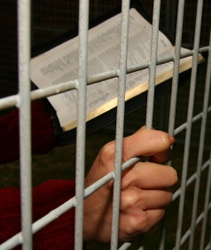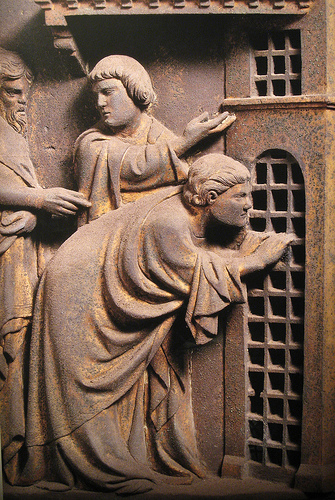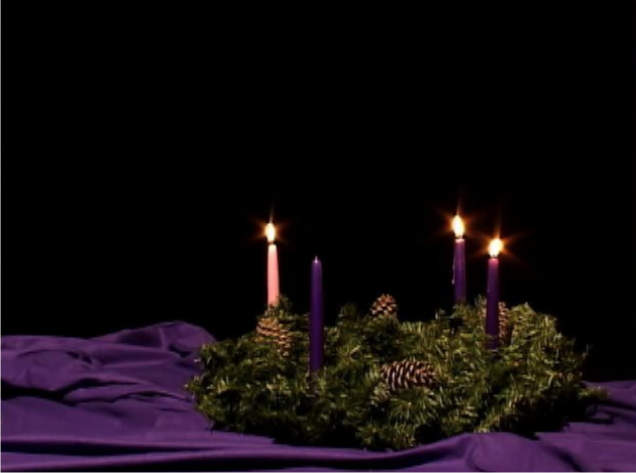Down the Nights and Down the Days: Advent for a Prisoner Priest
 My post in the Third Week of Advent last year was "Saint Gabriel the Archangel: When the Dawn From On High Broke Upon Us." It's one of my favorite Advent posts. By that, I don't mean that it's any sort of masterpiece or anything. It's one of the posts I most enjoyed writing. We repeated it on the Feast of the Archangels last September in “To Guard You In All Your Ways." Though the Feast of the Annunciation is March 25, my post on the Annunciation is special to me in Advent because, like Advent itself, it marks the beginning of Christian salvation history. It's also a beautiful pro-life story. The intent of God for life is clear in the three simple proclamations of the prayer we call The Angelus:
My post in the Third Week of Advent last year was "Saint Gabriel the Archangel: When the Dawn From On High Broke Upon Us." It's one of my favorite Advent posts. By that, I don't mean that it's any sort of masterpiece or anything. It's one of the posts I most enjoyed writing. We repeated it on the Feast of the Archangels last September in “To Guard You In All Your Ways." Though the Feast of the Annunciation is March 25, my post on the Annunciation is special to me in Advent because, like Advent itself, it marks the beginning of Christian salvation history. It's also a beautiful pro-life story. The intent of God for life is clear in the three simple proclamations of the prayer we call The Angelus:
“The Angel of the Lord declared unto Mary,And she conceived by the Holy Spirit.”“Behold the Handmaid of the Lord;Be it done to me according to your word.”“And the Word was made Flesh,And dwelt among us.”
Most of you know that I offer Mass in my cell late at night on Sundays. If you've read my two-part post, "The Sacrifice of the Mass," you know of my arduous trek through prison and Church bureaucracies to bring this great privilege about.Late on Sunday nights, after lockdown at 10:00 PM, the prison gradually grows quiet. By 11:15, the guards have completed their last prisoner count of the day. All the shouting and foul language that seem to fill every moment of every day here fades away by then. It's the sole time I have found that is conducive to offering Mass in a prison cell without interruptions and a cacophony of background noise that - believe me - sounds nothing like a choir of angels.Most TSW readers also know that my friend, Pornchai, joins me for Mass and usually reads the first two readings. It's the most important time of our week. I mentioned Pornchai recently in “What Do John Wayne and Pornchai Moontri Have In Common?" This weekly celebration of the Eucharist is the source of all our hope.And one of those hopes is that it's also a source of grace for the readers of These Stone Walls for whom we offer Mass each week. I made an important statement in my recent post about Pornchai's conversion, and the special challenges he faces. The statement was this: "It is not suffering that is our problem, but rather what we do with it when it finds us."It found me, and, no doubt about it, it found Pornchai as well. It was actually his idea to offer Mass each Sunday for those who have been reading These Stone Walls that week. The idea came about as we discussed ways we can observe in prison our personal Consecration to Saint Maximilian Kolbe’s two movements, the Militia of the Immaculata and the Knights at the Foot of the Cross. I described our Consecration in "The Paradox Of Suffering: An Invitation from St. Maximilian Kolbe.”

At that time, we invited TSW readers to consider joining us in such an offering of personal trials and suffering. Doing so doesn't mean that you just surrender to suffering in silence. And it doesn't mean that I surrender quietly to unjust imprisonment. We should do all in our power to confront injustice, to restore ourselves and others to health, and to live in freedom from anxiety and oppression.The offering of suffering simply means that as we endure it – as each of us will – we endure it in faith, and use it to identify with the suffering of Christ and, like Christ, present it to God as a prayer offering for others. Joining us in Consecration as Knights at the Foot of the Cross would be a very special way to open a dialogue of grace. Sacrificial love is the most powerful source of grace in salvation history, and it gives meaning to suffering.The National Shrine of St. Maximilian Kolbe in Libertyville, Illinois maintains a website to assist you in your own Consecration at www.consecration.com. Your Consecration should take place on any Marian feast and then be registered at the Consecration website. If you choose the Solemnity of Mary, Mother of God on January 1st, then the nine-day period of preparation would begin Christmas Eve. It's a wonderful way to celebrate the true meaning of Christmas.MASS CONFUSIONAfter Mass on the Solemnity of Christ the King on November 20, l told Pornchai that this was my last Mass “on autopilot.” In the late 1960s, when I first began attending Mass as a teen - when the rest of my peers were just beginning to drift away - the Second Vatican Council had just commenced a change from Mass in Latin to Mass in the vernacular.That transition was easy for me because I had only vague recollections of the responses in Latin such as "Et cum spiritu tuo." Five years later in 1973, however, a new Mass translation was adopted that made little sense to me. I could not understand how "Et cum spiritu tuo" could possibly be translated as "And also with you." It seemed a little too vernacular, stopping just short of responding, "You too!" I went along with it because I was twenty and was supposed to be flexible, but some of the older members of my parish formed a resistance movement. At times, my heart went out to them for the vast change they were being asked to accept in blind faith.Now, nearly forty years later, the Church has thought better of this translation, and the result is far more faithful to the language and intent of the Latin Mass. So from a spiritual perspective, I welcome this change. From a purely pragmatic perspective, however, I've had to rise to the occasion just like all of you. No more autopilot. Now I must carefully consult the Roman Missal for every word and phrase, and I have already stumbled a few times during the first two weeks of Advent.But the fact that I am able to observe the new translation at all is a grace brought about by two very kind TSW readers, Tom and Jo Ann Glenn, who realized at some point that even obtaining a new Roman Missal would be a special challenge for me. So they made arrangements to order one for me, and it arrived two weeks before Advent. I am most grateful to them for this beautiful and thoughtful gift. They also sent two "Pew Cards" published by Magnificat and containing all the new common prayers and responses of the people. It was most thoughtful. So I had no excuse not to be prepared. A few days before Advent began, I walked into my cell one evening to see our friends Pornchai and Donald Spinner carefully studying the Magnificat Pew Cards and contrasting the new translation with the old. It was a strange scene, and it struck me that there is probably no other prison in the world where two prisoners chose to pass up a football game on TV to prepare themselves for coming changes in the Mass. That's when I knew I had work to do. I wasn't going to be the only one stumbling through Mass, so I spent a week before Advent studying the Roman Missal and new translation. I offer my humble thanks to Tom and Jo Ann Glenn, and ask you to offer a prayer for them as well. Their gift to me was also a gift to the readers of These Stone Walls.Offering Mass in a prison cell is a little like offering Mass in a battlefield. We don't have the luxury of an altar, and must make do with what we've got - which isn't much. In the middle of the floor in this eight-by-twelve-foot cell are two concrete stumps that protrude about two feet out of the concrete floor. Just inches to one side of my stump is an iron bunk, and inches to the other side is a concrete counter protruding sixteen inches from the stone cell wall.At first, I offered Mass sitting on the concrete stump with my Mass kit spread at the edge of my bunk. One of my treasures is a Hammond World Atlas. Whenever TSW readers post comments that mention where they are, Pornchai and I like to find their town or city in the Atlas. So far, we have had readers from 31 countries. So I used the Atlas upon which to place my Corporal as a sort of symbol that we offer Mass for TSW readers around the world.But I had some difficulty with offering Mass in the same spot in which I spend the night snoring. So I turned around. Our world in prison is a world in miniature, so the change was not dramatic. I still use the Atlas, but now I place it on the concrete counter with the Corporal spread upon it. It’s the same spot in which I type these posts, and the same spot in which I pray the breviary. Pornchai offered use of his side of the concrete counter for cooking meals, making coffee, and other activities so that we're not using the Mass location for anything else (except typing). What we have for Mass isn’t a cathedral. It's an area two-foot square in a place that otherwise has seen much darkness, and the wilderness of poverty of human spirit at its worst.IN THE WILDERNESSThere was an awkward moment at Mass on the Third Sunday of Advent last year. I wanted to write of it then, but didn't. I'm not even sure why I avoided it, but I've thought of it often since then. It's hard to believe a year has passed. The Gospel that day was from Saint Matthew (11:2-11):
So I had no excuse not to be prepared. A few days before Advent began, I walked into my cell one evening to see our friends Pornchai and Donald Spinner carefully studying the Magnificat Pew Cards and contrasting the new translation with the old. It was a strange scene, and it struck me that there is probably no other prison in the world where two prisoners chose to pass up a football game on TV to prepare themselves for coming changes in the Mass. That's when I knew I had work to do. I wasn't going to be the only one stumbling through Mass, so I spent a week before Advent studying the Roman Missal and new translation. I offer my humble thanks to Tom and Jo Ann Glenn, and ask you to offer a prayer for them as well. Their gift to me was also a gift to the readers of These Stone Walls.Offering Mass in a prison cell is a little like offering Mass in a battlefield. We don't have the luxury of an altar, and must make do with what we've got - which isn't much. In the middle of the floor in this eight-by-twelve-foot cell are two concrete stumps that protrude about two feet out of the concrete floor. Just inches to one side of my stump is an iron bunk, and inches to the other side is a concrete counter protruding sixteen inches from the stone cell wall.At first, I offered Mass sitting on the concrete stump with my Mass kit spread at the edge of my bunk. One of my treasures is a Hammond World Atlas. Whenever TSW readers post comments that mention where they are, Pornchai and I like to find their town or city in the Atlas. So far, we have had readers from 31 countries. So I used the Atlas upon which to place my Corporal as a sort of symbol that we offer Mass for TSW readers around the world.But I had some difficulty with offering Mass in the same spot in which I spend the night snoring. So I turned around. Our world in prison is a world in miniature, so the change was not dramatic. I still use the Atlas, but now I place it on the concrete counter with the Corporal spread upon it. It’s the same spot in which I type these posts, and the same spot in which I pray the breviary. Pornchai offered use of his side of the concrete counter for cooking meals, making coffee, and other activities so that we're not using the Mass location for anything else (except typing). What we have for Mass isn’t a cathedral. It's an area two-foot square in a place that otherwise has seen much darkness, and the wilderness of poverty of human spirit at its worst.IN THE WILDERNESSThere was an awkward moment at Mass on the Third Sunday of Advent last year. I wanted to write of it then, but didn't. I'm not even sure why I avoided it, but I've thought of it often since then. It's hard to believe a year has passed. The Gospel that day was from Saint Matthew (11:2-11):
"When John the Baptist heard in prison of the works of the Christ, he sent his disciples to Jesus with this question, 'Are you the one who is to come, or should we look for another?' Jesus said to them in reply, 'Go and tell John what you hear and see: the blind regain their sight, the lame walk, lepers are cleansed, the deaf hear, the dead are raised, and the poor have the good news proclaimed to them. And blessed is the one who takes no offense at me.’"
I have heard and read that Gospel passage many times during my life, but on the Third Sunday of Advent last year, I seemed to really hear it for the very first time. And I knew that what struck me also struck Pornchai. John the Baptist was in prison, but this seemed not at all to be of concern to Jesus. He sent John's followers back to him in prison with a message about what they have witnessed: "The blind regain their sight, the lame walk, lepers are cleansed, the deaf hear, the dead are raised, and the poor have the good news proclaimed to them." But what about John left in prison? Must he be content with that news, hearing it, but never seeing it?But the news had a power that left John speechless - like his father was left speechless in my Advent post, "When the Dawn From On High Broke Upon Us" at the moment John's very existence in his mother's womb was made known. Last year’s Advent Gospel cited above is the last time we hear from Saint John the Baptist. John never speaks again in Saint Matthew’s Gospel after this encounter with the Christ from his prison cell.

I honor the bearers of that Good News to John the Baptist in prison. We in prison are lepers – the guilty and innocent alike – but the Good News is that Christ sees a deeper meaning to the quality of life than just our state in it, or the misfortunes that come our way, or the truths we are unable to see until our spiritual awakening.You have been for us like those visitors who returned to John the Baptist in prison with the news of what they see and hear of Christ in our world. By visiting These Stone Walls, and learning of us, you have been for us the "Angels We Have Heard On High." This is your Corporal Work of Mercy, and a great gift to this prisoner who thanks and honors you for it. Your presence here marks the Advent of hope, and the fulfillment of the mercy that is otherwise missing from justice. By your visit, you disperse the gloomy clouds of night.O come, 0 Dayspring from on high,And cheer us by Your drawing nigh;Disperse the gloomy clouds of night,And death's dark shadow put to flight.O come, Desire of nations, bindIn one the hearts of humankind;Make all our sad divisions cease,And be for us the King of Peace.(Veni, Veni Emmanuel, 9th Century Chant, vs. 6,7)
